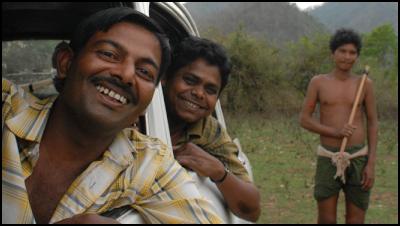Cowboys In India
Cowboys In India

In partnership
with The Film Archive, Travelling Film Southasia and the New
Zealand India Research Institute present two films out of
the 36 documentaries that screened in the competitive
section of the 2011 Film Southasia festival in Kathmandu.
Dharavi, Slum for Sale (2010) and Cowboys in India
(2009) are Indian films that magnify pressing Southasian
matters.
In Dharavi, Slum for Sale the elephant has awoken. Bombay, India’s gateway to the West, has reinvented itself – and emerged as Mumbai, a modern, self-confident commercial metropolis. A magnet for the hopes of the rich and poor. But with thousands of migrants pouring in every day, half of its almost 20 million inhabitants are forced to live in slums, between the cracks of the official city. The biggest of these slums is called Dharavi. Ten years ago, US-trained architect Mukesh Mehta came back to India to usher in a new turn in Mumbai’s slum-rehabilitation policies.
His formula is public-private partnership. Billions of dollars could be made – if the responsibility for a radical makeover of Dharavi were to be put into the hands of private investors. The government has been persuaded by Mehta’s vision and has appointed him as the consultant for the Dharavi Redevelopment Project. While thousands of families living and working in the slum are facing the threat of being evicted, Dharavi is becoming a test case. Not only for Mumbai or India, but for the future of the underprivileged of the entire world. The film was directed by Lutz Konermann.
Cowboys in India is a sly subversion of a well-trodden story that sets up the viewer to believe that we’re going to learn about the evils perpetrated by the London-based mining company Vedanta Resources in rural India. Long before the now-familiar mix of pollution, land-grabbing, false promises and thuggish “bodyguards” hit the UK headlines, film maker Simon Chambers had relocated to Orissa for several years to try to understand the realities of development in the “third world,” but with a lot more on his mind than a simple exposé.
The real narrative in this funny and clever film leaks out in dribs and drabs, and concerns Satya (the “organiser”) and Doya (the driver), and their complicated relationship with Simon. Playing the very model of the modern British documentarian, Simon confounds all expectations and subtly questions the conventions of the documentary genre. In the end, the threats are more immediate, and more serious, than anyone would have guessed.
The Travelling Film South Asia tradition started with the first Film Southasia festival held in Kathmandu in September 1997. Since then, following each biennial “mother festival,” about a dozen films have been selected to tour regionally and globally.
To date, FSA has organised a total of seven TFSAs, each travelling to an average of 50 venues worldwide.
The TFSA ’12 package travels with the willing authorisation of the individual film makers on the understanding that the screenings are “non-commercial.”
Both screenings are
open to the public, free of charge. Dharavi, Slum for
Sale will screen at 7pm Wednesday June 5; Cowboys in
India 5.15pm Thursday June 6. At The Film Archive, 84
Taranaki St, Wellington.
ENDS


 BNZ Breakers: BNZ Breakers Beaten By Tasmania Jackjumpers On Christmas Night
BNZ Breakers: BNZ Breakers Beaten By Tasmania Jackjumpers On Christmas Night Te Whatu Ora Health NZ: Health Warning – Unsafe Recreational Water Quality At Roto Kohatu Reserve At Lake Rua
Te Whatu Ora Health NZ: Health Warning – Unsafe Recreational Water Quality At Roto Kohatu Reserve At Lake Rua Shearing Sports NZ: Shearing Them Around - 11 Shearing Records In 2024
Shearing Sports NZ: Shearing Them Around - 11 Shearing Records In 2024 The New Zealand Retro: Special End Of Year Retro Chart Show On Independent Radio Stations
The New Zealand Retro: Special End Of Year Retro Chart Show On Independent Radio Stations ASB Polyfest: Polyfest’s 50th Celebrations On Track Despite Funding Cuts
ASB Polyfest: Polyfest’s 50th Celebrations On Track Despite Funding Cuts Air New Zealand: Raw Thrills - Air New Zealand's Most Popular Inflight Entertainment Revealed
Air New Zealand: Raw Thrills - Air New Zealand's Most Popular Inflight Entertainment Revealed